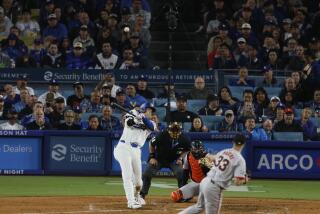Roger Clemens trial: Opening arguments begin in perjury case
- Share via
Reporting from Washington — In a Washington courtroom three blocks from Capitol Hill, one of Major League Baseball’s biggest names – 11-time All Star pitcher Roger Clemens – went to trial Wednesday before a jury of 12 citizens and a court of public opinion disgusted with scandals over steroids and other banned drugs that have threatened the credibility of the game.
Clemens, who won seven Cy Young awards, stands charged with perjury, obstructing Congress and making false statements when three years ago he told congressional investigators and testified in an open hearing that he never used steroids or human growth hormone (HGH).
“Let me be clear,” he told Congress. “I have never taken steroids or HGH.
“I have not used steroids or growth hormone.... I am just making it as possibly clear as I can. I haven’t done steroids or growth hormone.”
He is the latest in a string of prominent athletes whose fame and prowess have been tarnished by persistent allegations that they turned to drugs to improve their performance. Indeed some of the star witnesses at Clemens’ trial — of up to 140 who may be called as the trial unfolds — will be some of his fellow athletes, trainers and managers as the jury of 10 women and two men tris to determine whether the 48-year-old Clemens lied when he insisted to Congress that he never used the drugs.
Some of the star witnesses likely to be called include Andy Pettitte, a former three-time All-Star pitcher and Clemens’ teammate. Pettitte has admitted using HGH and is expected to testify that Clemens told him he did too.
Also likely to testify is Brian McNamee, a strength and conditioning coach, who claims he injected Clemens with steroids for four seasons starting in 1998. Durham said McNamee kept the needles and cotton balls as incriminating evidence so that he himself was not “thrown under the bus,” and that traces of anabolic steroids were found on the needles and swabs.
Clemens’ chief defense attorney, Rusty Hardin of Houston, told the jurors that “the heart of this case is whether Roger Clemens is telling the truth.”
Clemens was indicted by a federal grand jury last August, and on Wednesday morning in opening statements Assistant U.S. Atty. Steven Durham told jurors to “walk outside on Constitution Avenue and look to your left and you’ll see a magnificent view of the Capitol building of the United States.”
It is that structure, he said, and the law that anyone taking the oath must tell the truth, that is the bedrock of this case. Witnesses cannot lie, especially if it impedes Congress’ ability to do its job. In the Clemens case, the House Oversight Committee was investigating the illegal use of drugs and “restoring faith in America’s pastime,” Durham said.
“To knowingly say things that they know not to be true, these are very serious federal crimes,” he said.
The prosecutor said that in the 1990s Major League Baseball had a “serious drug problem,” that steroids were injected into the abdomens of athletes and the drugs “worked, they were very effective” in helping to build muscle and prevent injury.
“Major League Baseball is a very demanding game that tears the body down every day,” Durham said. “Players are constantly battling injuries and these drugs help the players recover.
“This is a business. It’s a child’s game but it’s a business. There’s only a limited number of jobs and every year younger players come into the game and they want to take the jobs of older players.”
Durham said the congressional committee was trying to protect young people from “dangerous drugs and dangerous influences” and threatened to pass legislation banning the drugs. The league then stepped up and began its own investigation.
Congress expected to hear the truth from Clemens. Instead, Durham said, “when he raised his right hand and he swore that he never used the drugs, that was false and he knew that it was false.”
Clemens, who retired three years ago, sat in the courtroom in a gray suit and tie. He has not been charged with using the drugs during his years on the mound. Now his legacy, and perhaps his shot at a slot in baseball’s Hall of Fame, rests with this case.
He pitched for the Boston Red Sox, Toronto Blue Jays, New York Yankees and Houston Astros. If convicted, he faces up to 30 years in prison and a $1.5-million fine.
richard.serrano@latimes.com
More to Read
Go beyond the scoreboard
Get the latest on L.A.'s teams in the daily Sports Report newsletter.
You may occasionally receive promotional content from the Los Angeles Times.










